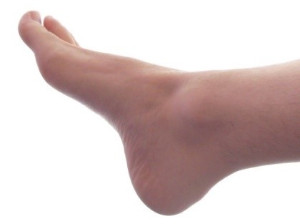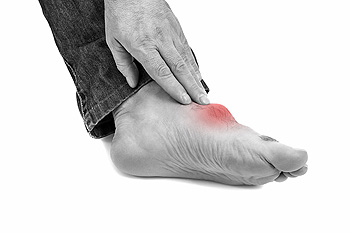 The bones in the ankle are connected by a variety of ligaments. Ankle sprains occur when these ligaments become either overstretched or torn, usually because the ankle is twisted. Mild ankle sprains mean that the ankle is tender and swollen, but more severe ankle sprains can make the ankle unstable and unable to support any weight. Patients who believe they may have sprained an ankle would be wise to consult with a podiatrist, because the symptoms of an ankle sprain are similar to those of a broken ankle, and an x-ray may be necessary. Recurring or severe sprains can also cause long-term weakness and joint pain. Upon the diagnosis of an ankle sprain (or fracture), a podiatrist will be able to provide a treatment plan for the injury.
The bones in the ankle are connected by a variety of ligaments. Ankle sprains occur when these ligaments become either overstretched or torn, usually because the ankle is twisted. Mild ankle sprains mean that the ankle is tender and swollen, but more severe ankle sprains can make the ankle unstable and unable to support any weight. Patients who believe they may have sprained an ankle would be wise to consult with a podiatrist, because the symptoms of an ankle sprain are similar to those of a broken ankle, and an x-ray may be necessary. Recurring or severe sprains can also cause long-term weakness and joint pain. Upon the diagnosis of an ankle sprain (or fracture), a podiatrist will be able to provide a treatment plan for the injury.
Although ankle sprains are common, they aren’t always minor injuries. If you need your ankle injury looked at, contact one of our podiatrists from Foot Health Center of Merrimack Valley. Our doctors can provide the care you need to keep you pain-free and on your feet.
How Does an Ankle Sprain Occur?
Ankle sprains are the result of a tear in the ligaments within the ankle. These injuries may happen when you make a rapid shifting movement while your foot is planted. A less common way to sprain your ankle is when your ankle rolls inward while your foot turns outward.
What Are the Symptoms?
- Pain at the sight of the tear
- Bruising/Swelling
- Ankle area is tender to touch
- In severe cases, may hear/feel something tear
- Skin discoloration
Preventing a Sprain
- Wearing appropriate shoes for the occasion
- Stretching before exercises and sports
- Knowing your limits
Treatment of a Sprain
In many cases, the RICE method (Rest, Ice, Compression, and Elevate) is used to treat ankle sprains. However, you should see a podiatrist to see which treatment option would work best with your injury. In severe cases, surgery may be required.
It is important to ask your doctor about rehab options after you receive treatment for your injury. Stretching, strength training, and balance exercises may help the ankle heal while also preventing further injury.
If you have any questions, please feel free to contact one of our offices located in North Andover, and Tewksbury, MA . We offer the newest diagnostic and treatment technologies for all your foot care needs.










